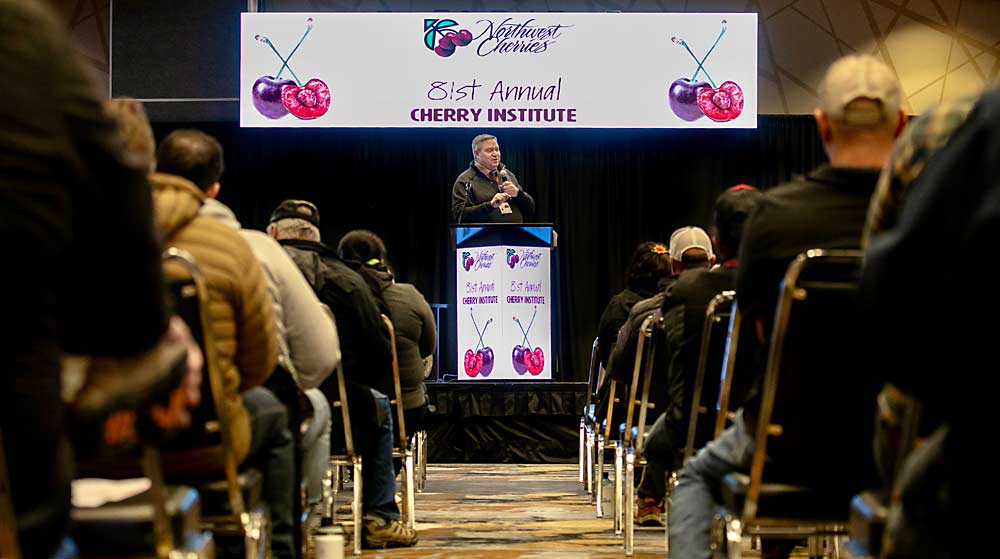
The Northwest Cherry Growers gathered on a frigid Friday morning in Yakima for the 81st annual Cherry Institute featuring an inspirational keynote speaker with a tale of overcoming adversity, the latest horticultural research, a sobering analysis of the past year’s market and an optimistic outlook on the future.
“We can sell 26 million boxes, we can sell 30 million profitably, if we have the right spread,” said Robert Kershaw, CEO of Domex Superfresh Growers, during a panel on cherry marketing at the annual Cherry Institute meeting. The compressed 2023 crop, in contrast, was like trying to force 6 inches of water through a 2-inch pipe. “Cherries have a very bright future, but we are going to have these years like last year.”
Despite the curveballs Mother Nature can throw, Kershaw and fellow panelists Mike Taylor, senior vice president of Stemilt Growers, and Jeff Baldwin, sales director at Sage Fruit Co., stressed that they see a strong market ahead and that the 2023 market was an outlier, not the new normal.
“Northwest growers did a phenomenal job raising great fruit and (in 2023) did not get rewarded for it. That’s heartbreaking,” he said. But climate conditions created a record-setting overlap with California, not a planned push to expand into the Northwest’s marketing window. “There’s things that can move the crop forward and back, but the California grower community is planting for the early to mid-May marketing window.”
Looking ahead, it’s clear that quality drives the market, Taylor said.
“The consumer experience is just getting better and better and better. We’ve come so far, and I couldn’t be more optimistic,” he said.
Cherry King
That enthusiasm, a characteristic of Taylor’s 40-plus-year career, was rewarded when the industry named him as the 79th Cherry King.
“I love the product, but I love the people more,” Taylor said.
Pat Sullivan, the 2023 Cherry King, placed the crown on Taylor’s head.
Taylor grew up on a Yakima cherry orchard and first managed the orchard at age 14 when his mom had to drive him places, Sullivan said while introducing Taylor.
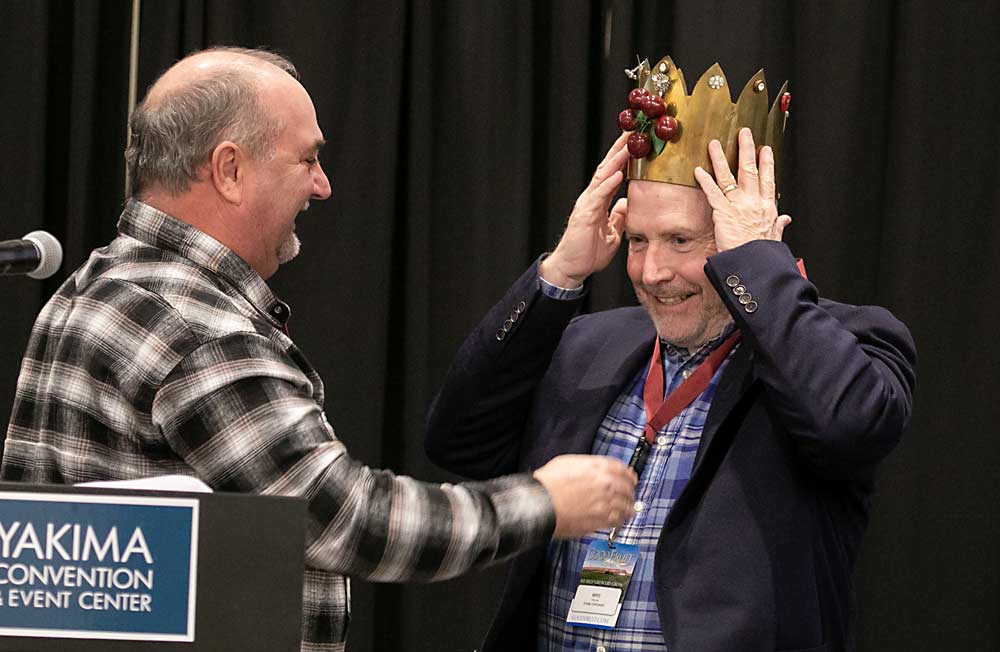
He joined the sales team at Stemilt in 1994, helping pioneer consumer packaging to boost retail sales, and is known for diligently seeking high fruit prices.
Taylor has served on many fruit industry boards, including the Washington Cherry Marketing Committee, the Washington Farm Bureau, the Processed Pear Committee and Pear Bureau Northwest. In December, he was granted the Silver Pear Award at the Washington State Tree Fruit Association Annual Meeting.
He and his family of five still have an orchard near Wenatchee with apples, pears and about 300 acres of cherries.
Northwest Cherry Growers, which represents producers in five Western states, created the Cherry King award in 1945. Winners are nominated and chosen each year by previous honorees.
Inspiring keynote
Shaquem Griffin, a former NFL linebacker, delivered a moving keynote lunch address about relying on family and faith to overcome doubt, fear and adversity.
Griffin was born with amniotic band syndrome that left the fingers of his left hand underdeveloped and extremely sensitive to pain. Doctors amputated his hand at age 4. He went on to star in the high school and college football ranks in Florida, alongside his twin brother, Shaquill. The brothers were both drafted in 2018 by the Seattle Seahawks.
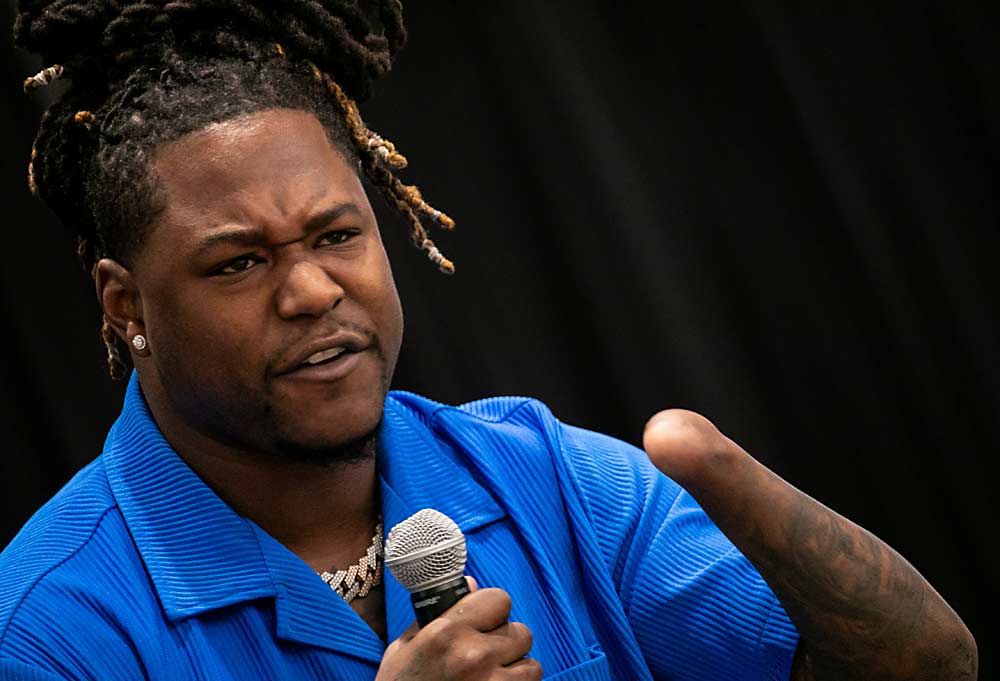
Griffin said losing his hand set him free to play rough-and-tumble sports with his brothers, so he asked the lunch crowd: “What do you have to cut off to gain your freedom, to live your dreams, to become the best version of yourself?”
Griffin retired in 2022 to join the NFL Legends, a group of former players who mentor current players, and is now a motivational speaker and advocate for disability inclusion.
Shaquill Griffin currently plays for the Carolina Panthers.
He was asked one fruit-related question: How does he think the fruit industry should market cherries. He suggested social media, especially videos that show the hidden hard work behind the product, something he finds attractive about any field or topic.
“Market the work that you do,” he said.
—by Kate Prengaman and Ross Courtney

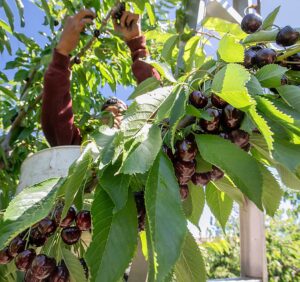



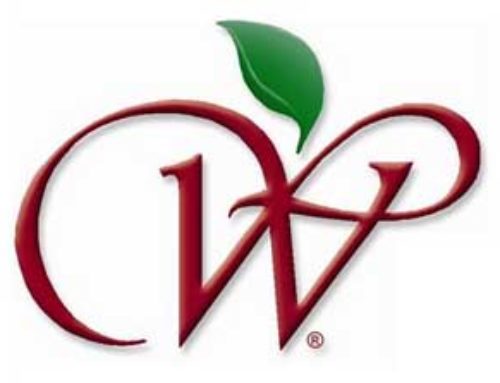

Leave A Comment